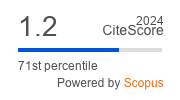Social Network Research: Transfer of Interdisciplinarity
Keywords:
web-wave, net-centricity, mobilization capability, social networks, transfer of interdisciplinarity, trans-paradigmality.Abstract
Net-Centricity is a meaningful cognitive-pragmatic marker of modern global communications; it stipulates for decentralisation and acceleration of information circulation as well as for agility of decision elaboration and decision-making; it also improves the passage of communicative flows by creating the branched networks regardless of their geographical distance. Web-based social networking is just one of the manifestations of the net-centricity of the modern world. In the 21st century the classical science’s postulates (simplicity, stability, determinancy) were replaced by postulates associated with "non-linear" thinking (disequilibrium, instability, irreversibility). This phenomenon became the basis for the further development of the idea of interdisciplinarity as a poli-, multi-, trans-paradigmality (an activity at the intersection of sciences that stipulates the use of methods and correlation of the results of several branches of scientific knowledge) as well as meta-paradigmality (creation of comprehensive, unifying doctrine capable to replace the research areas’ confrontation by their synthesis). Exploring social network as a self-organizing system capable to affect the conceptual world view of the national and international community, involves the transfer of interdisciplinarity into scientific research. This fact contributed to the determination of three areas of social networks research: analytical capacity of social networking, network landscape of the Internet, e-communities. Mobilization ability as a basic parameter of social networks, which should be studied within interdisciplinary paradigmб is regarded as an establishment of communications entailing public interest and potentially capable to foster collective actions in the real space. Some mobilization ability parameters are illocutionary settings for social networks` visitors to inform and to communicate; shaping the world view through the system of filters; the principle of relevance; strengthening the dialogue; use of social networks as a research platform and so on. Mobilization ability of network communications has led to global challenges. Their study is only possible within interdisciplinary paradigm: the loss of control over communicative space, blurring authority; revolution of stakeholders; potential globalization of local problems and crises; resistance at the concepts` level.
References
- Albitov, А. (2012). Facebook: Kak Nayti 10000 Drusey Dla Vashego Bisnesa Besplatno
[Facebook: How to Find 10000 Friends for your Business Costless]. Moscow: Mann, Ivanov&Ferber. - Alexanyan, K., Barash V. (2012). Exploring Russian Cyberspace: Digitally-Mediated
Collective Action and the Networked Public Sphere. Retrieved 07.03.2015
from http://ssrn.com/abstract=201499. - China’s Year of the Microblog: Tracking an Online Revolution in 140 Characters or
Less, (2012). Retrieved 07.03.2015 from http://stats.berkman. harvard.edu. - Deibert, R., Palfrey, J. (2008). Practice and Policy of Global Internet Filtering. Retrieved
07.03.2015 from http://cyber.law.harvard. edu. - Deibert, R., Palfrey, J. (2012). Security, Identity, and Resistance in Asian Cyberspace
Retrieved 07.03.2015 from http://access. opennet.net/2011/12/ access-contested-book-launch. - Etling, B., Kelly, J. (2010). Mapping the Arabic Blogosphere: Politics, Culture and Dissent.
Retrieved 07.03.2015 from http://cyber.law.harvard.edu - Etling, B., Alexanyan, К. (2011). Public Discourse in the Russian Blogosphere: Mapping
RuNet Politics and Mobilization. Retrieved 07.03.2015 from http://cyber.law. harvard.edu. - Fonotov, A. (1993). Rossiya; ot Mobilisacionnogo Obshestva k Innovacionnomu [Russia:
from the Mobilizative Society to Innovative]. Мoscow: Nauka. - Gedds, B. (2014). Google AdWords: ischerpivayshee rukovodstvo [Goocle AdWords : a
comprehensive guide]. Moscow: Mann, Ivanov&Ferber. - Goroshko, Е. (2011). Kommunicatciya 2.0 kak Novoe Napravlenie v Lingvistike Interneta
[Communication as a New Trend in Linguistics of Internet]. Retrieved 07.03.2015
from textology.ru›article. aspx?aId=239. - Grishakova, Y. (2011). Socialnie Seti i Ikh Klassifikaciya [Social Networks and Their
Classification]. Retrieved 07.03.2015 from http://egrishakova.ru/blog/ item/70-sotsialnyie-seti-i-ihklassifikatsiya - Heacock, R. (2011). Blogging Common Releases Overview of English Blogosphere.
Retrieved 07.03.2015 from http://stats.berkman.harvard.edu. - Heflin, Ch. (2012). The Syndication Revelation: The Perpetual Internet Traffic Machine.
Retrieved 07.03.2015 from http://synnd.com/docs/The-Syndication- Revelation.pdf. - Huyghe, Fr. (2009). D'Ukraine en Syrie, cette guerre des images et de la com' qui se joue
discrètement sous nos yeux. Retrieved 07.03.2015 from http://www.atlantico.fr/decryptage/ukraine-ensyrie/cette/ guere. - Kastels, М. (1999). Stanovlenie obshestva setevih struktur [Becoming society networks] (pp.
296–308). In: Novaya Postindustrialnaya Volna na Sapade [The new wave on post-industrial West].
Мoscow: Academia. - Knyaseva, Y. (2012). Osobennosti Ssbora informatsii v issledovaniyah socialnih setey
[Features of information collection in social networks studies]. Retrieved 07.03.2015 from
http://www.ffsn.bsu.by/ffsn. files/caf/k-sk/personal-sk/knyazeva/ Knyazeva-doc/1_ Knyazeva-doc.pdf. - Rosina, I. (2012). Komputerno-oposredovannaya Kommunocatia v Praktike Obrasovaniya i
Bisnesa [Computer-mediated Communication in Practice, Education and Business]. Retrieved
07.03.2015 from http://www. russcomm.ru/rca_biblio/r/rozina01.shtml.







 Creative Commons «Attribution» 4.0
Creative Commons «Attribution» 4.0